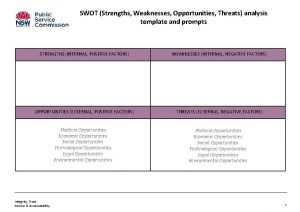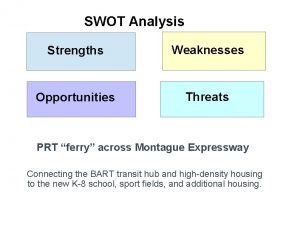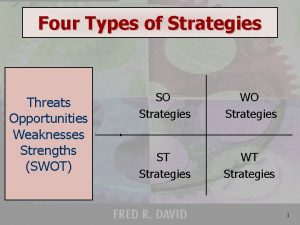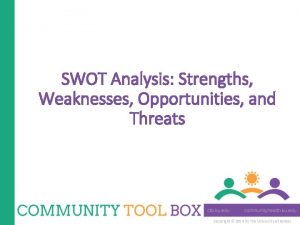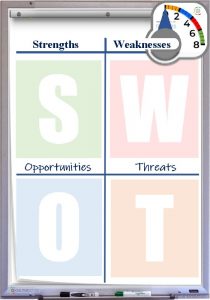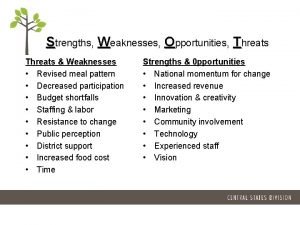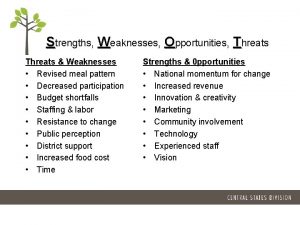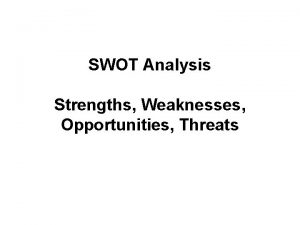Strengths Weaknesses Opportunities Threats Analysis in relation to









- Slides: 9

Strengths Weaknesses Opportunities Threats Analysis in relation to Advanced nursing practice (APN) becoming recognised as a valid part of nursing and health care service provision globally Carried out 29 th June 2006, Sandton, South Africa by Fadwa Affara

Strengths q Determination (and stamina) to reach ANP goals q Capable of undertaking complex decision making in relation to patient care q Participation in policy q Evidence of competence making and formulation of legislation exists in some countries q Highly skilled q Able to work independently of nurses working in the ANP roles, and managing complex health problems q Evidence of capability pf APN to deliver PHC and be entry point into the health system

Strengths q Consumer trust q Demonstrated acceptance by public q An international definition of APN exists q Information technology is used to access information about APN q Affiliated/and or organised as a group internationally and nationally in some countries q When not organised have a willingness to create some form of professional organisation q Show great commitment and will to act to advance practice

Weaknesses q Poor role clarification q Uncertain identity q Proliferation of titles q Scope of practice conflicts with other health professionals q APNs practise under varied levels of autonomy q Lack of clear identity affecting ability of APNs to communicate q Failure to get ANP into clear messages about ANP human resources planning q Lack of recognition by other (APN needs assessment, health professionals role descriptions) q Mistrust in nursing between q Absence of career ANPs and other nurses causing ladders APNs to feel more at easy with medical rather than nursing values

Weaknesses q Fragmentation/ variability in standards and quality of education programmes q Educational programmes may not keep up with the changing realities of practice q Insufficient numbers of mentors q Inappropriate reimbursement systems for APNs q Inability to properly cost ANP services (private provider) q Lack of a political will in supporting the role

Opportunities q Diversity of APN practice creating discussion/ stimulating interest globally q Migration opening new opportunities to learn and advance personal competence q Health care systems in crisis globally q Nurses ability to influence health care through grass root means as well as by influencing top policy makers q Workforce development in flux Changing health care environment q Interest in innovative healthcare delivery models q Sharing good practice q Increasingly aware and vocal consumers who want to be involved in health decision making q Strengthening voice of women in the public arena

Opportunities q Nurses can bring much experience and knowledge to health care and occupy a pivotal position (deal with primary needs of human beings) q Nursing education moving into the university sector q Nurses seen capable of taking a leading role in health/social development q APNs being seen as a means to meet unmet health needs q Creating alliances with groups outside nursing q Physician shortage q Rising demand for management of chronic disease

Threats q Medicalisation of health systems –medical dominance q Territorial protection q Insufficient influence to affect health decisions and resource allocation q Inadequate political skills/ strategies q Value system of political decision–makers unfavourable to APN goals, e. g. using economic retrenchment to cut APN services to marginalised underprivileged groups q Diversity may lead to fragmentation q APN perceived to be too expensive

Threats q Complacency q Apathy q Burnout q Low status of nurses – poor payment, recognition and contributions health care not valued q Severe staff shortages q Lack of clinical career pathways q Insufficient faculty q Insufficient definition of roles and scope of practice q Low levels of funding– for education and post creation q Indemnity insurance difficult to obtain and becoming expensive
 Strengths opportunities threats weaknesses
Strengths opportunities threats weaknesses Strengths opportunities threats weaknesses
Strengths opportunities threats weaknesses Advantages of content analysis
Advantages of content analysis List of opportunities and threats
List of opportunities and threats Opportunities and threats of a bakery
Opportunities and threats of a bakery Swot analysis of a teacher
Swot analysis of a teacher Swot analysis example for teachers
Swot analysis example for teachers Opportunity and threat
Opportunity and threat List of opportunities and threats of a student
List of opportunities and threats of a student Mbti strengths and weaknesses
Mbti strengths and weaknesses
